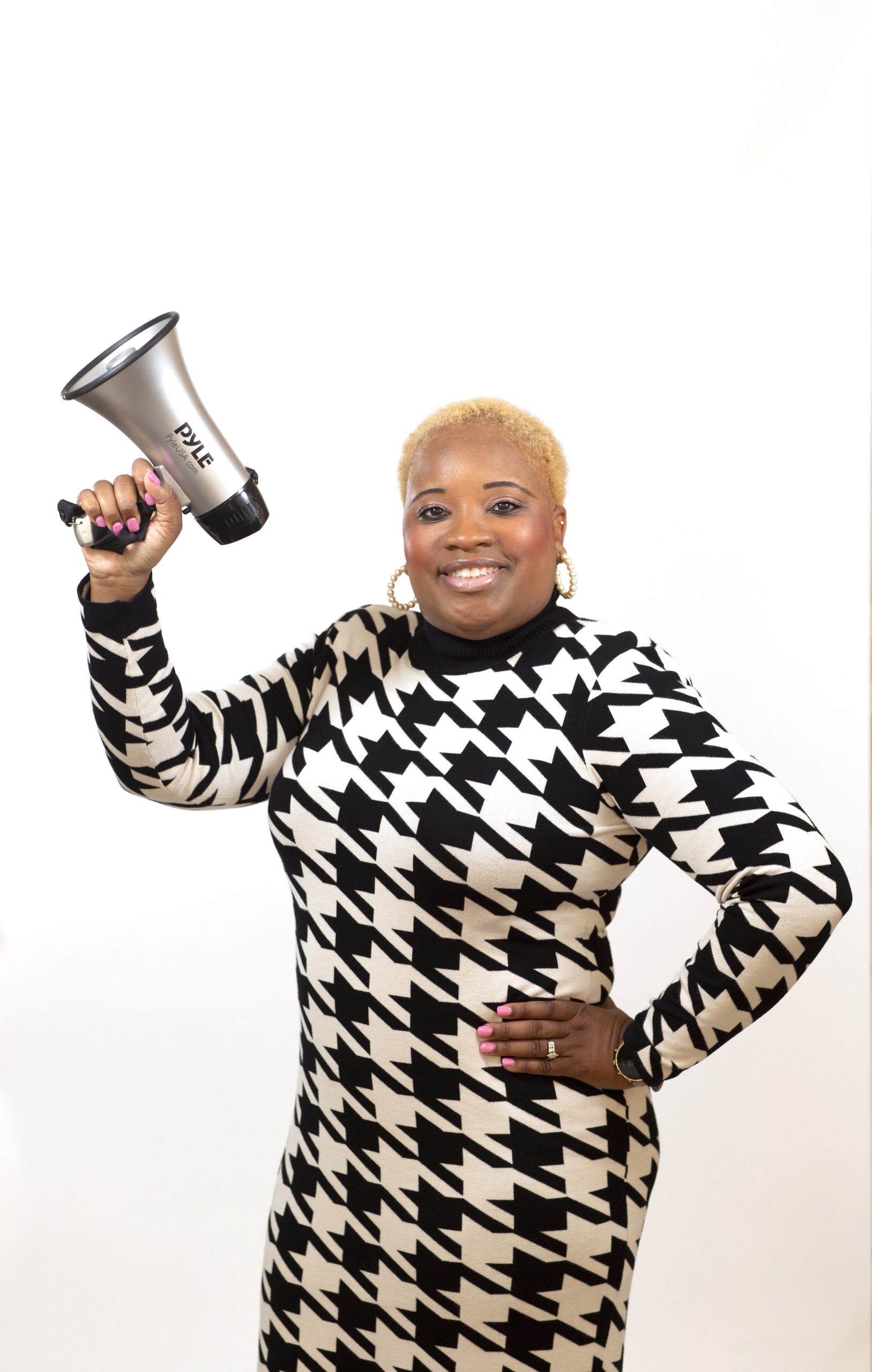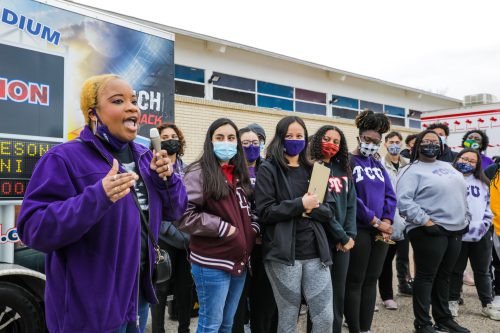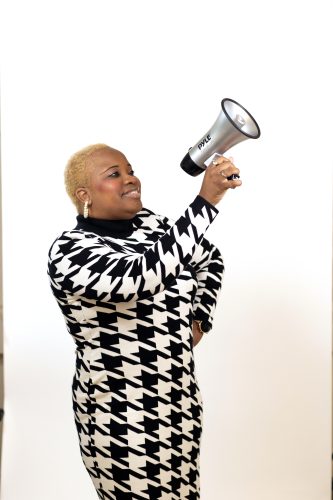Q&A: Timeka Gordon
Her job is making TCU more accessible and inclusive.

Timeka Gordon is director of TCU's Intercultural Center. She also directs Student Identity and Engagement and the Community Scholars program. Photo by Carolyn Cruz
Q&A: Timeka Gordon
Her job is making TCU more accessible and inclusive.
Timeka Gordon ’21 EdD, director of the Intercultural Center and Student Identity and Engagement, describes herself as a woman of faith who is passionate about helping people become the best version of themselves. Also director of TCU’s Community Scholars program, she facilitates the funding of full academic scholarships to students in Tarrant and Dallas counties. During her time on TCU’s staff — 14 years and counting — she earned a doctorate in higher education leadership.
Growing up, how important was education to you and your family?
My parents always instilled in me the importance of education. And they said that to all my siblings; we were expected to earn a bachelor’s degree. I was the first in my family to earn a master’s degree, and I am the only person in my family to earn a doctorate. So, I think that came as a surprise. But I wanted to show my nieces and nephews what was possible, and my parents supported me 100 percent. As a woman of color, they knew that I needed it to be taken seriously and to be given opportunities and have doors open for me.
You are a proud member of the Alpha Kappa Alpha sorority. What inspired you to join?
What first piqued my interest in joining a sorority was growing up watching A Different World. And I remember seeing Spike Lee’s Skool Daze. So that was my first awareness of it, even though my parents are Greek. My dad is an Alpha Phi Alpha and my mom was a part of an auxiliary group known as Alpha Angels. The creation of historically Black fraternities and sororities was a result of Black people not being able to join white fraternities and sororities in college. The women that I looked up to — the majority of them were Alpha Kappa Alphas. And so that’s how my interest in Alpha Kappa Alpha came to be.

The MLK on Main Street Committee selected Timeka Gordon, left, as a recipient of the 2021 MLK Stone of Hope Award. Photo by Amy Peterson
You published Beta Mu Omega: Where the Best Begins, over 75 Years of Timeless Service in 2013. Why did you write a book highlighting your sorority?
At the time, I was serving as the historian and archivist for the Beta Mu Omega chapter, the graduate chapter here in Fort Worth, of Alpha Kappa Alpha Sorority, Incorporated. Our international president wanted all chapters to write a history book. I was afraid, but I stepped into the fear. I said, “OK, I need some coconspirators” — Deidra Turner ’96 who, at the time, I worked for her husband, Dr. Darron Turner ’87, and then Paige Zinsou Ruiz ’11, who was a Community Scholar and had joined Alpha Kappa Alpha here at TCU. The three of us co-authored that book. At the time, our chapter was celebrating right around 75 years here in the city of Fort Worth. We divided up 25 years apiece, and we did the research. We talked to so many people, unearthed so much history on the impact that our chapter has had here in Fort Worth. It has inspired me to write more books in the future. I’m in the process of updating that history; I’ll be doing a second edition of that book, as well as sitting down and crafting my own book. Writing that history book also gave me the confidence to write my dissertation.
When did you first realize you had a passion for helping others get a college education?
Growing up, I was like the resident therapist in my friend group. But I think it was when I was an undergraduate at UT Arlington and I wanted to leave. I wanted to go to a HBCU [historically black college or university]. Although I had grown up in predominantly white or mixed neighborhoods, I struggled with a sense of belonging in that first semester. My mentor, Mr. Zeb Strong, was what I needed. That made me say, “I want to be him for folks that look like me.”
As director of the Intercultural Center and student identity and engagement, what is the most pressing issue?
In 2023, we still have students coming here who feel like they wouldn’t be welcomed here, or they wouldn’t be supported here. And you know that that is a huge task and undertaking, but I see the possibilities. I’m willing to put in the work, and I want the students and the TCU community as a whole to put in the work.
Are you nervous entering white spaces as a Black woman?
The reality is, before I even open my mouth, I am a Black woman with natural hair; sometimes I wear a weave, a wig, braids. And I’m outspoken, respectfully. I have earned the right to speak up. I have earned the right to hear my voice. I have earned the right to say that I know what I’m talking about. I have earned the right to say that my experiences and my life and those who look like me — and don’t look like me — that we matter.
I want to have a seat at the table among everyone else. And I want to be able to be heard, to know that what I say matters and is being considered and thought about, and that if I bring good ideas and things of value to the table, you will listen and implement. And I am good enough because God made me good enough. And my experience and my degrees have qualified me. When I show up as my authentic self, I’m giving you 100 percent; I am fully committed. And when I know that people are invested in me as my authentic self, then it’s a win-win for the both of us.
How can allies help?

“Speak up when you know things are being said and done to the detriment of the Black women that you call yourself a friend of, and then listen when we tell you that we’ve had these experiences.” – Timeka Gordon | Photo by Carolyn Cruz
Speak up when you know things are being said and done to the detriment of the Black women that you call yourself a friend of, and then listen when we tell you that we’ve had these experiences. Believe us when we tell you that we’ve been mistreated, or someone has said something disrespectful. Many times, what happens is colleagues, friends will hear it and see it and won’t call it out in the moment, but then want to text and call me afterwards. That’s not allyship; that’s not true support. Do it right then and there.
What does the Community Scholars program mean to you?
The Community Scholars program means everything to me; they are the reason I came to TCU. I was able to use my experiences as a person of color at UTA who lost her scholarship. When I first got here, if you made a mistake, you automatically lost it. It took a couple of years; I convinced the administration to allow me to say, “OK, if a student makes a mistake, can we reconsider? Can we give them another chance, put them on probation?” I’ve seen what the program has done for the students that have matriculated. And hands down, it has been life changing. I’ve loved the careers that they’ve gotten and the families that they’ve created.
When you’re in the process of selecting new Community Scholars, what are you looking for?
I look beyond the GPA and the class rank because TCU admissions looks at all of that. I look at the story: How will it change that student’s life? What sort of adversity have they had, and what has gotten them to this point? I’m looking for fighters, people that have been knocked down and can get back up, because this is not going to be easy. I’m looking for folks that understand that this is more than just a scholarship; the legacy of this program, and coming to an institution like TCU, it’s bigger than them. Do they want to be a part of the story?
How has the Community Scholars program surprised you?
What has surprised me is the number of Community Scholars that have gone on to earn doctorates. I’ve seen this number grow in the 14 years I’ve been here; I’m extremely excited. Some of the graduate programs that they’re going into are at Brown University and Harvard. The second thing is the increased number of Community Scholars studying abroad who had never left the state of Texas or the country. I know what it’s like to be counted out or not seen as valuable because of the color of our skin. But they are showing TCU and Fort Worth Black excellence, Latinx excellence, Asian excellence and Native American excellence.
How did it feel the first time a high school student cried in your arms upon hearing that they received a full scholarship?
I got really emotional. I pray to God before every notification, that he covers those that are not able to be awarded the scholarship and that God opens the door for them. And then I pray for those that we do have the opportunity to offer it to, and that they experience success and support. But the first student that cried in my arms, it was deep — I still remember to this day. I’m still in contact with the student years later, and he’s doing amazing things. But it just solidified for me why I’m here, why I’m doing what I’m doing.
What legacy would you like to leave?
The legacy I hope to leave is one that people can hear my name or look at a picture of me and say that I left everything that God put in me — I left it out here. It wasn’t about me; it was about trying to help other people. Whether that is in helping them succeed and accomplish a goal that they have for themselves to knowing that they are loved, seen, valued and heard.
Editor’s Note: The questions and answers have been edited for length and clarity.

Your comments are welcome
2 Comments
I love your story Soror! Thank you for your big heart and all that you do!!
Linda Iglehart
Amen to the article specifically Timeka’s comments about …looking beyond the GPA…
It’s the kid’s heart and compassion that will help them succeed.
Related reading:
Features
Community Scholars Bring New Perspectives
Scholarship program opens up a world of possibilities to North Texas’s underserved elite students.